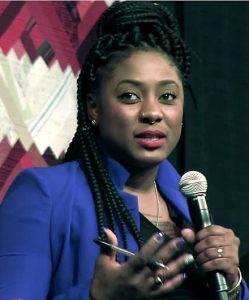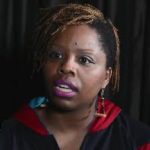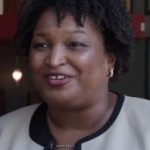Activism
Black Lives Matter, Stacey Abrams Nominated for Nobel Peace Prize
“We hold the largest social movement in global history,”



Patrisse Cullors

Stacey Abrams

Patrisse Cullors
The Black Girl Magic just keeps on keeping on.
Black Lives Matter, founded by Patrisse Cullors, Opal Tometi and Oakland’s own Alicia Garza, won Sweden’s Olof Palme human rights prize for 2020 on Saturday and was nominated for the Nobel Peace Prize along with voting rights activist and lawyer Stacey Abrams.
BLM was founded in 2013 after the acquittal of the man who killed 17-year-old Trayvon Martin who was attacked on his way home from a walk to the local store in Sanford, Fla., in February of 2012.
Seven years later, after the high-profile killing of George Floyd and others, about 20 million people took to the streets in protest in the U.S. and around the world using the name of the loosely structured organization.
“This illustrates that racism and racist violence is not just a problem in American society, but a global problem,” Palme prize organizers said.
In awarding the $100,000 prize last weekend, organizers said the foundation had “in a unique way exposed the hardship, pain, and wrath of the African-American minority at not being valued equal to people of a different colour.”
Around the same time, BLM was nominated for a Nobel Peace Prize by Norwegian lawmaker Petter Eide. In his nomination papers, Eide said BLM deserved the award “for their struggle against racism and racially motivated violence… BLM’s call for systemic change have spread around the world, forcing other countries to grapple with racism within their own societies.”
“We hold the largest social movement in global history,” Black Lives Matter tweeted in response on January 29. “Today, we have been nominated for the Nobel Peace Prize. People are waking up to our global call: for racial justice and an end to economic injustice, environmental racism, and white supremacy. We’re only getting started.”
Eide has since taken some heat from critics who believe BLM is a violent organization. But he reminded them that similar criticism arose when Rev. Dr. Martin Luther King Jr. was nominated and later received the Nobel prize in 1964.
BLM, to Eide, follows in King’s footsteps as well as in those of anti-apartheid freedom fighter Nelson Mandela in 1993.
Eide’s sentiments paralleled those of Lars Haltbrekken, a Norwegian legislator who nominated Stacey Abrams for the Nobel Peace prize on Saturday.
Abrams, the powerhouse who fought the voter suppression tactics that are believed to have led to her defeat in Georgia’s gubernatorial race in 2018, was nominated for the prize for helping to boost voter turnout in 2020 through nonviolent activism.
In a statement released to Reuters, Haltbrekken said, “Abrams’ work follows in Dr. Martin Luther King Jr.’s footsteps in the fight for equality before the law and for civil rights.”
Abrams launched Fair Fight, a voting rights movement encouraging voter registration, after she lost the gubernatorial race by 55,000 votes as her opponent, the Georgia Secretary of State at the time, purged thousands from the voter rolls.
“In the wake of the election, my mission was to figure out what work could I do, even if I didn’t have the title of governor,”Abrams said at the time. “What work could I do to enhance or protect our democracy? Because voting rights is the pinnacle of power in our country.”
Fair Fight was her answer to that question.
“Abrams’ efforts to complete King’s work are crucial if the United States of America shall succeed in its effort to create fraternity between all its peoples and a peaceful and just society,” Haltbrekken said.
If she wins, Abrams would join fellow Georgians King and former president Jimmy Carter, who won in 2002, as Nobel Peace prize winners.
Abrams’ declined to comment on the nomination.
Nominating someone is relatively easy, though not taken lightly. Members of national legislatures, universities, international courts of law and former Nobel winners are among those who can put a name to the Nobel committee. Last year, there were 210 individuals nominated and 107 organizations were nominees for the peace prize, which comes with a cash award of$1,145,000.
The Nobel committee will announce the short list of nominees in March.
Reuters, The Atlanta Journal-Constitution, BBC News and CBS news are the sources for this report.
Activism
OP-ED: AB 1349 Puts Corporate Power Over Community
Since Ticketmaster and Live Nation merged in 2010, ticket prices have jumped more than 150 percent. Activities that once fit a family’s budget now take significant disposable income that most working families simply don’t have. The problem is compounded by a system that has tilted access toward the wealthy and white-collar workers. If you have a fancy credit card, you get “presale access,” and if you work in an office instead of a warehouse, you might be able to wait in an online queue to buy a ticket. Access now means privilege.

By Bishop Joseph Simmons, Senior Pastor, Greater St. Paul Baptist Church, Oakland
As a pastor, I believe in the power that a sense of community can have on improving people’s lives. Live events are one of the few places where people from different backgrounds and ages can share the same space and experience – where construction workers sit next to lawyers at a concert, and teenagers enjoy a basketball game with their grandparents. Yet, over the past decade, I’ve witnessed these experiences – the concerts, games, and cultural events where we gather – become increasingly unaffordable, and it is a shame.
These moments of connection matter as they form part of the fabric that holds communities together. But that fabric is fraying because of Ticketmaster/Live Nation’s unchecked control over access to live events. Unfortunately, AB 1349 would only further entrench their corporate power over our spaces.
Since Ticketmaster and Live Nation merged in 2010, ticket prices have jumped more than 150 percent. Activities that once fit a family’s budget now take significant disposable income that most working families simply don’t have. The problem is compounded by a system that has tilted access toward the wealthy and white-collar workers. If you have a fancy credit card, you get “presale access,” and if you work in an office instead of a warehouse, you might be able to wait in an online queue to buy a ticket. Access now means privilege.
Power over live events is concentrated in a single corporate entity, and this regime operates without transparency or accountability – much like a dictator. Ticketmaster controls 80 percent of first-sale tickets and nearly a third of resale tickets, but they still want more. More power, more control for Ticketmaster means higher prices and less access for consumers. It’s the agenda they are pushing nationally, with the help of former Trump political operatives, who are quietly trying to undo the antitrust lawsuit launched against Ticketmaster/Live Nation under President Biden’s DOJ.
That’s why I’m deeply concerned about AB 1349 in its current form. Rather than reining in Ticketmaster’s power, the bill risks strengthening it, aligning with Trump. AB 1349 gives Ticketmaster the ability to control a consumer’s ticket forever by granting Ticketmaster’s regime new powers in state law to prevent consumers from reselling or giving away their tickets. It also creates new pathways for Ticketmaster to discriminate and retaliate against consumers who choose to shop around for the best service and fees on resale platforms that aren’t yet controlled by Ticketmaster. These provisions are anti-consumer and anti-democratic.
California has an opportunity to stand with consumers, to demand transparency, and to restore genuine competition in this industry. But that requires legislation developed with input from the community and faith leaders, not proposals backed by the very company causing the harm.
Will our laws reflect fairness, inclusion, and accountability? Or will we let corporate interests tighten their grip on spaces that should belong to everyone? I, for one, support the former and encourage the California Legislature to reject AB 1349 outright or amend it to remove any provisions that expand Ticketmaster’s control. I also urge community members to contact their representatives and advocate for accessible, inclusive live events for all Californians. Let’s work together to ensure these gathering spaces remain open and welcoming to everyone, regardless of income or background.
Activism
Oakland Post: Week of December 31, 2025 – January 6, 2026
The printed Weekly Edition of the Oakland Post: Week of – December 31, 2025 – January 6, 2026

To enlarge your view of this issue, use the slider, magnifying glass icon or full page icon in the lower right corner of the browser window.
Activism
Big God Ministry Gives Away Toys in Marin City
Pastor Hall also gave a message of encouragement to the crowd, thanking Jesus for the “best year of their lives.” He asked each of the children what they wanted to be when they grow up.

By Godfrey Lee
Big God Ministries, pastored by David Hall, gave toys to the children in Marin City on Monday, Dec. 15, on the lawn near the corner of Drake Avenue and Donahue Street.
Pastor Hall also gave a message of encouragement to the crowd, thanking Jesus for the “best year of their lives.” He asked each of the children what they wanted to be when they grew up.
Around 75 parents and children were there to receive the presents, which consisted mainly of Gideon Bibles, Cat in the Hat pillows, Barbie dolls, Tonka trucks, and Lego building sets.
A half dozen volunteers from the Big God Ministry, including Donnie Roary, helped to set up the tables for the toy giveaway. The worship music was sung by Ruby Friedman, Keri Carpenter, and Jake Monaghan, who also played the accordion.
Big God Ministries meets on Sundays at 10 a.m. at the Mill Valley Community Center, 180 Camino Alto, Mill Valley, CA Their phone number is (415) 797-2567.
-

 Activism4 weeks ago
Activism4 weeks agoDesmond Gumbs — Visionary Founder, Mentor, and Builder of Opportunity
-

 Activism4 weeks ago
Activism4 weeks agoFamilies Across the U.S. Are Facing an ‘Affordability Crisis,’ Says United Way Bay Area
-

 Alameda County4 weeks ago
Alameda County4 weeks agoOakland Council Expands Citywide Security Cameras Despite Major Opposition
-

 Alameda County4 weeks ago
Alameda County4 weeks agoBling It On: Holiday Lights Brighten Dark Nights All Around the Bay
-

 Activism4 weeks ago
Activism4 weeks agoBlack Arts Movement Business District Named New Cultural District in California
-

 Activism4 weeks ago
Activism4 weeks agoOakland Post: Week of December 17 – 23, 2025
-

 Activism4 weeks ago
Activism4 weeks agoLu Lu’s House is Not Just Toying Around with the Community
-

 Activism3 weeks ago
Activism3 weeks agoFirst 5 Alameda County Distributes Over $8 Million in First Wave of Critical Relief Funds for Historically Underpaid Caregivers
















































